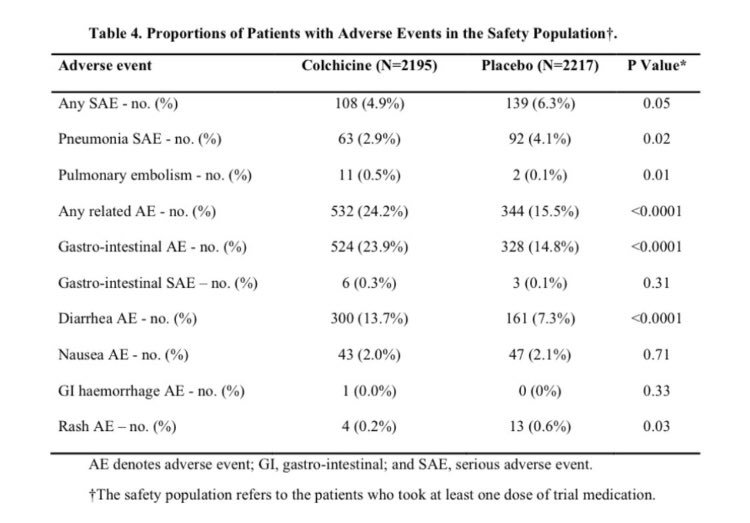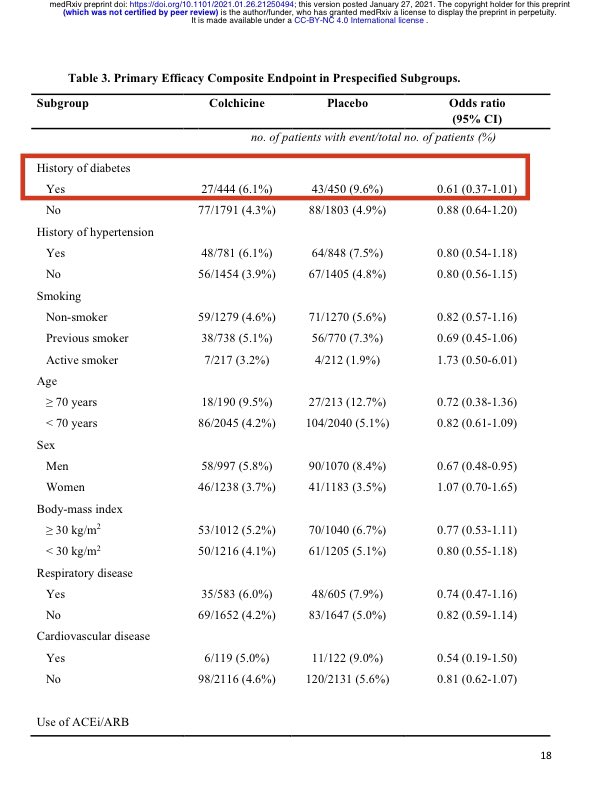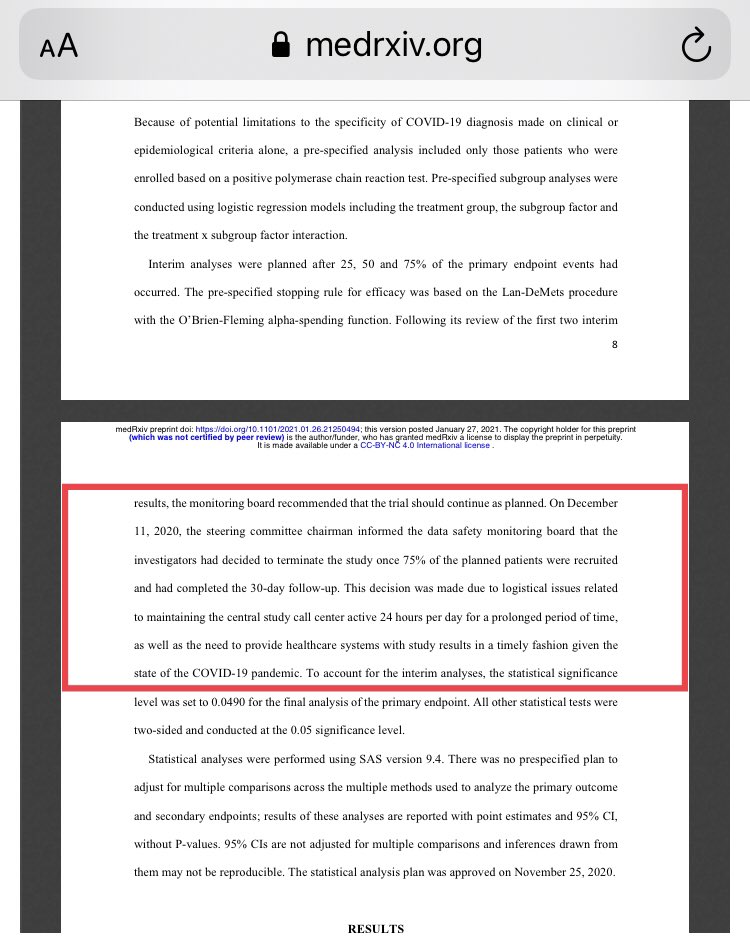The #colcorona preprint was posted last week. I was busy in a review panel so this is coming a bit later, but here’s my take, as a scientist who has (a) diabetes and (b) some epidemiological training. Thread. https://www.medrxiv.org/content/10.1101/2021.01.26.21250494v1
NB: “some epidemiological training” = I have a background in math & took many epi & stats grad courses. I specialize in digital health decision support, so I have to be able to understand the data well. However, my PhD was in human factors engineering, not epi.
tl;dr If I got COVID, I would meet the inclusion criteria for the trial (40s, diabetes.) In such a case, I would take colchicine if it were offered. The potential benefits outweigh the potential harms for me.
We now have evidence from multiple countries that people with type 1 diabetes (like me) have ~3X greater odds of being hospitalized or dying due to COVID than people without diabetes. (Numbers are similar/a bit lower for people with type 2.) See: https://twitter.com/Jandelliott/status/1348813946791333888
Here are the potential harms of colchicine in the trial. Pulmonary embolism is the biggest one in my view. Diarrhea is also a potential problem depending on your living circumstances. (It’s puzzling to me that they list pneumonia here, given it’s a COVID trial.)
Here are the potential benefits of colchicine. Among people with diabetes in the trial (type not specified but likely mostly type 2), 27/444 (6.1%) randomized to colchicine were hospitalized or died. This is compared to 43/450 (9.6%) in the placebo arm.
The odds ratio is 0.61 with a 95% confidence interval (CI) of 0.37-1.01. That means that it probably isn’t statistically significant (because the CI crosses 1.) This is not a huge concern to me because (a) it’s a subgroup analysis and
(b) statistical significance is not a true/false lightbulb. It’s one indicator, based on an arbitrary number (alpha=.05). If they’d had more people with diabetes in this subanalysis with roughly the same distributions, the CI could be something like .40-.98. Who knows. 

And please miss me with your assessment of whether that difference is clinically significant. I assure you that a possible extra 3.5 percentage points’ chance of remaining available to raise my children matters to me, and it’s my judgment that matters about my life, not yours.
That’s as good as it gets in terms of information quality for now. There’s uncertainty, and I’m used to that. Like other with my condition, every day, many times a day, for decades, I’ve dosed myself with tiny amounts of medicine that will kill me if I get too much or not enough.
I dose it based on 1) measures of blood glucose that regulators allow to vary +/- 20% and 2) my best guess of how my body will absorb X g carbs - Y g fibre with Z g protein & W g fat in the context of my activity level, stress, hormones, insulin absorption today/this minute, etc.
A less-than-perfect trial does not even come close to the level of uncertainty I manage in my health decision making every day. Bottom line: I’m glad the trial was done. I wish it had been done a bit better. Oh well. I’m still glad to have more (imperfect) information.
That’s it. There are other people critiquing the trial from a purely academic perspective, pointing out some of the limitations I try to teach my students to spot. (The big one is that they stopped it early & don’t fully explain the logistical problems that led to that decision.)
Another criticism I’ve seen is that the authors analysed data with & without people diagnosed with COVID-19 based on symptoms only. To me, the fact that the potential effect of the drug gets stronger when it’s more certain that people actually had COVID is a point in its favour.
Anyway, my reasoning for posting all this is simply that there aren’t as many of us who have some of those academic skills as well as a very personal stake, so for whatever it’s worth, I’m sharing a point of view that is less well-represented already.
This thread is also a subtweet of colleagues who claim to be against misinformation, yet are tweeting/speaking with more (negative) certainty than I think is warranted, potentially influencing public views.
People should be supported in making truly informed decisions, and sometimes that means making the best possible use of imperfect information.
Evidence is not either perfect or garbage. There’s a spectrum. And again, statistical significance is not a binary true/false marker, not even from a frequentist standpoint.
There are other studies underway testing colchicine and other medications (e.g., RECOVERY https://www.recoverytrial.net/ ) so I’m sure everyone will be happy to see those results added to the growing evidence base when they are available. /end
Thank you to @MJ_Fave for alerting me to this explanation for early stopping (as well as answers to other questions.) https://twitter.com/mj_fave/status/1356295022933663744
I offer my pretend text that I half-jokingly suggested last week: https://twitter.com/hwitteman/status/1354794709420548099

 Read on Twitter
Read on Twitter




